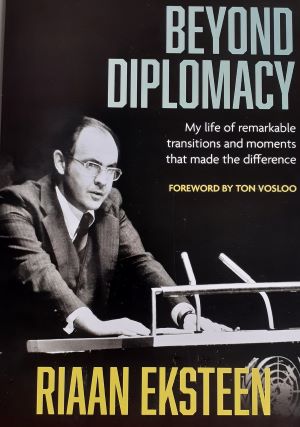Riaan Eksteen’s Beyond Diplomacy: My life of remarkable transitions and the moments that made the difference
17 October 2022
Riaan “Kudu” Eksteen’s life story took place over more than five decades in South Africa’s public domain. He started working as a young diplomat during the government of Hendrik Verwoerd. During his time under B.J. “John” Vorster, P.W. Botha, F.W. de Klerk and N.R. “Nelson” Mandela, Eksteen served as an ambassador to several countries and to the United Nations (UN) in New York and Geneva. He was also Director-General of the South African Broadcasting Corporation (SABC). Eksteen is currently active in the academic sphere and is a political consultant.
Eksteen indicated the purpose of his memoir in Beyond Diplomacy. He wanted to reflect on some of the events he had experienced up close or in which he had been involved. Therefore, the book does not give details of his outlook on life or his career, nor does it provide a historical overview.
The book does, however, provide a valuable source on South Africa’s diplomatic history.
Historian Jamie Miller states that such sources are not to be taken for granted, not least because of the methods of record-keeping, secrecy and the destruction of records during the National Party (NP)’s last years of rule.
South West Africa / Namibia
Under Hendrik Verwoerd (1958–1966), the South African Republic’s apartheid reforms, such as the homelands policy, decolonisation, ties with African states and alliances in the Cold War were all politically linked. Eksteen confirms that Verwoerd played an active role in foreign relations.
 A golden thread through Eksteen’s diplomatic career was his involvement in South Africa’s handling of South West Africa (SWA), later Namibia, and its internationalisation. Eksteen lifts the veil on this process. He discusses the 1963–1966 court case at the International Court of Justice when he had to provide support to R.F. “Pik” Botha and tells how South Africa got the text before the judge’s favourable ruling. Pik Botha would become South Africa’s Minister of Foreign Affairs after 1977.
A golden thread through Eksteen’s diplomatic career was his involvement in South Africa’s handling of South West Africa (SWA), later Namibia, and its internationalisation. Eksteen lifts the veil on this process. He discusses the 1963–1966 court case at the International Court of Justice when he had to provide support to R.F. “Pik” Botha and tells how South Africa got the text before the judge’s favourable ruling. Pik Botha would become South Africa’s Minister of Foreign Affairs after 1977.
Eksteen had to work for decades while international pressure on South Africa increased. In his thirties, Eksteen became an ambassador to the UN. He describes how his relationship with Kurt Waldheim, then the UN Secretary-General, improved after he made it clear that the Namibian issue could not be resolved without South Africa’s cooperation.
Although South Africa was a member state, the UN General Assembly acted in favour of the South West African People’s Organization (SWAPO) and the African National Congress (ANC). Eksteen was expelled from the General Assembly three times due to the rejection of South Africa’s credentials. This was often accompanied by front-page photos in The New York Times.
The UN Security Council Resolution 435 (1978) on Namibia focused only on the transfer of power and elections. However, during the administration of United States (US) President Ronald Reagan, Eksteen established a relationship of trust with Chester Crocker, the US Assistant Secretary of State for African Affairs, and his team. The diplomats were able toidentify their common interests, level the political playing field, and establish constitutional principles in the run-up to Namibia’s independence.
Détente, intelligence and war
Eksteen’s diplomatic work gained the trust of John Vorster (1966–1978) and later of P.W. Botha (1978–1989). He played a role in carrying out Vorster’s détente policy with Liberian President William Tolbert and tells how he was able to break the ice with African diplomats.
In many states’ embassies, there are complex relationships between diplomats and the representatives of the intelligence services, and he writes about his experiences, some good and some less good.
An ongoing theme is Eksteen’s aversion to the militarisation of foreign policy. Already under Vorster, P.W. Botha, as Minister of Defence, stepped forward with such an approach. The SA Defence Force (SADF) operations in Angola in 1975 took place with the promise of support from the US Central Intelligence Agency (CIA). That support was later stopped by the US Senate, and the red-faced SADF had to withdraw. Eksteen’s judgment is that P.W. Botha and his advisers were blind to signs that contradicted their estimates and ignored people who differed from them.
Later attempts by the Military Intelligence Division in South Africa to influence US policy through operations, Eksteen says, repeatedly destroyed the trust painstakingly gained or created new obstacles that diplomats had to overcome. As the historian Stephen Ellis points out, some securocrats distrusted Pik Botha’s close ties with the US.
Nevertheless, Eksteen’s judgment carries weight. He acknowledges the success of later SADF operations in Angola but questions whether it was worth the price. The end of that debate is not nearly in sight, not least among those who performed military service.
South African Broadcasting Corporation (SABC)
Eksteen was the SABC’s Director General from 1983 to 1988. The SABC was under a lot of financial pressure while South Africa experienced great political division and unrest. Eksteen restructured the SABC into more viable business units and sought to improve morale and productivity. He concluded a far-sighted deal with M-Net, which may have been very profitable had it not been thwarted by Brand Fourie as chairman of the SABC Board.
P.W. Botha, and later his wife Elize Botha, would call Eksteen whenever they were dissatisfied with TV broadcasts. It was probably unpleasant, but Eksteen’s stories about it are high-quality humour. Botha’s pressure on the SABC Board and salami tactics eventually weakened Eksteen’s position, and he left the SABC voluntarily in 1988. There was all manner of insinuation that he had not been able not improve the SABC’s poor financial position.
Nonetheless, business media and academics later found that he had, in fact, placed the SABC on a much firmer footing. F.W. de Klerk (1989–1994) appointed Eksteen as the first ambassador to an independent Namibia in 1990, stating, “[w]ith this decision, the injustice he suffered has now been reversed.”
Two political orders
The historian Hermann Giliomee refers to two revolutions in South Africa in the twentieth century: the apartheid policy of the NP with its aim of ensuring Afrikaner power and survival after 1948, and the unparalleled handover of power to the ANC by a leadership group that was neither defeated nor bankrupt. Eksteen served among the rulers of both orders and also during the transition period of 1990–1994. In the first order, he had to explain South Africa’s policy internationally. In the transition to the second order and afterwards, he argues, he was also able to justify and defend the policy.
In October 1991, Pik Botha informed Eksteen that Mandela wanted him appointed as ambassador to the UN. Mandela felt that the focus would change to getting help from the UN’s specialist agencies for socio-economic development. Botha calculated that it would take another two to three years before the ANC would come to power and advised Eksteen not to say no to his future head of state. And so it was that in 1994, when the ANC came to power, Eksteen, who had previously faced so many stormy seas at the UN in New York, was the ambassador to the UN, this time in Geneva.
Signposts
Beyond Diplomacy shows a similar professional approach by Eksteen in both political orders.
He did not want to be seen as a government apologist but as a credible and reliable diplomat for his country. Networking activities were ever-important, even with diplomats from countries considered as adversaries. He did not take criticism personally but distilled that which could be used positively.
The international scene was clearly more complex and with more geostrategic considerations and consequences than leading politicians or their constituents in distant South Africa always understood. As such, diplomats also had to be advisers to their governments and sometimes had to make difficult decisions in the national interest without necessarily receiving instructions about them. The “Dear Colleague” letters that Eksteen suggested to Pik Botha to inform cabinet members remain a scarce treasure trove of records of events.
After his diplomatic career, Eksteen conducted political consultation for companies from all over the world. He noted early on what influence the judiciary, in addition to the executive and the legislature, could have on foreign policy. The existing political science literature did not adequately identify this influence. Eksteen’s doctorate, which he obtained shortly before his 76th birthday in 2018, now fills the gap.
Power and personality
The versatile Eksteen was able to build up a vast diplomatic network as well as a large circle of benefactors and friends over the decades. Friendships and confidants empower political processes and actions and promote certain values, even though it is sometimes difficult to trace this influence. Simultaneously, Eksteen also had to experience the silence of some friends instead of their support in difficult times. His life story shows an appreciation for sincerity, measured thoughtfulness, steadfastness under pressure and a creative approach to problems.
Based on their experience, Helmut Schmidt, the German Chancellor, and Henry Kissinger, the US Secretary of State, came to the same conclusion: interests and power structures weigh heavily in international relations, but personalities can make a difference. Anyone who reads Beyond Diplomacy attentively will come away with a fresh look at one of the most effective and professional diplomats to ever serve South Africa.
Dr. Heinrich Matthee is a senior lecturer/researcher at the Hanze University of Applied Sciences, Groningen, Netherlands, a non-resident researcher at the Emirates Policy Center, Abu Dhabi, United Arab Emirates, and an extraordinary professor at North-West University, Potchefstroom, South Africa.

